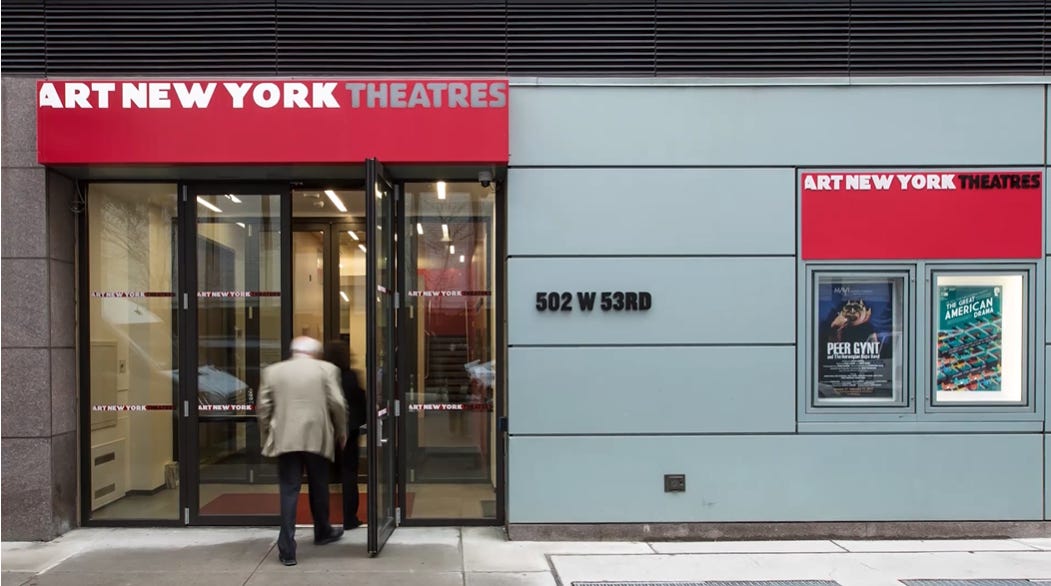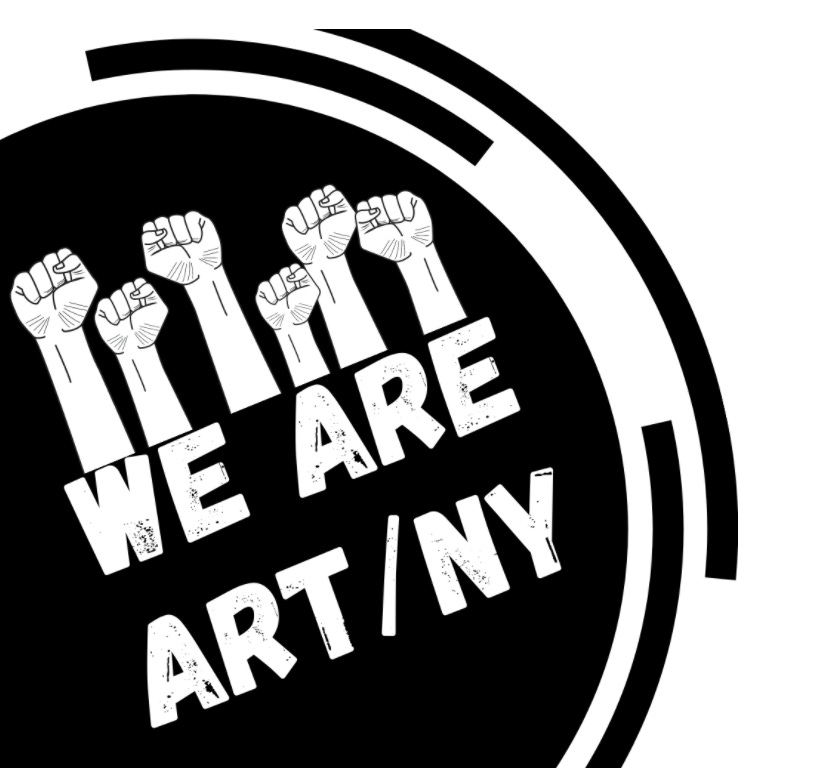As an industry reckons with itself, can A.R.T./NY lead by example?
The We Are A.R.T./NY coalition push for structural change to rid the service organization of "systemic racism"
The reckoning at The Alliance of Resident Theatres/New York began with something unusual - an audio recording. Staff members frustrated by the leadership of Executive Director Ginny Louloudes shared audio of her speaking bluntly in a July 2019 meeting around the question of including “anti-racism” and “anti-oppression” in A.R.T./NY’s stated mission goals.
“My generation of cisgender white individuals feel like, right now, A.R.T./New York is valuing everything but cisgender white people,” Louloudes says in the recording. “I don’t feel like I should be running A.R.T./New York if you’re going to shift the power. You need to have somebody else.”
Now as A.R.T./NY continues its work as a resource and industry leader for its over 400 member theaters across New York, the service organization also faces a reckoning of its own.
In July, a group of nine current and former staff members at the organization, The We Are A.R.T./NY Coalition, published an open letter to the board of directors demanding it address “systematic racism rampant at the organization.” The letter alleged a years-long toxic culture that had held up progress at A.R.T./NY and, by extension, at its member theaters.
“As a pillar of the non-profit theatre community directly serving 420+ New York theatre companies, A.R.T./New York has a moral obligation to lead the charge with regard to racial justice,” the letter read, asserting that internal complaints had gone ignored for two years, forcing the choice to go public and include the recording.
In their letter, We Are A.R.T./NY detail accounts of alleged microaggressions and tokenization by Louloudes, and assert that she ended affinity spaces for BIPOC staff and fundraising efforts to support DEI (Diversity, Equity and Inclusion) initiatives.
We Are A.R.T./NY’s demands included: the immediate removal of Louloudes; a guarantee of no retaliation against coalition members; a line item in the organizational budget every year for anti-racism, equity and inclusion work; affinity spaces for BIPOC staff and member companies; a secure process for staff to report racist treatment; bias training for all board members and staff; and an organizational values statement that specified anti-racism and anti-oppression as part of A.R.T./NY’s work.
The Board’s Executive Committee placed Louloudes on administrative leave and pledged to address the issues raised.
“We recognize the need to look at not only our current behavior but the organizational behavior that has brought us to this point,” the committee pledged in August.
At the same time, the board announced the appointment of Risa Shoup as interim executive director. The timing of the announcement, and Shoup’s track record in equity and accessibility, seemed to suggest a correlation — but in fact, a search had already been underway ahead of Louloudes taking a planned leave of absence.
A listening session on July 27 proved a fruitful beginning. “It was great to have a centered space for the coalition to just share what our experience has been,” said Hope Chávez, coalition member and artistic producer at Long Wharf Theatre. “So much of the board clearly didn’t even begin to know or understand the severity of the harm that was caused.”
Shortly after the session, however, the coalition was accidentally “cc-ed” on an e-mail from one board member suggesting they “ignore the coalition” going forward. Then, progress seemed to slow. “It felt like three steps forward and five steps back,” said Nathalie Thomas, coalition member and media & communications strategist at A.R.T./NY.
Many of the board members are full time arts administrators at other institutions and delays may, of course, reflect scheduling more than anything else. The Committee told me they did not even realize the lasting harm of that accidental “cc” until a September follow-up meeting.
The e-mail, they said, did not reflect their approach. “It was a heartbreaking thing to learn, and demonstrates so well why we need to speak directly to each other, rather than through entities like ‘the executive committee’ and ‘the coalition,’” the Committee said in October. “We hope we’re beginning to break those barriers down.”
In September, staff and board formed two separate anti-racism committees to look at their own practices through an EDI lens and analyze best paths forward.
Interim executive director Shoup had become the go-between for board, staff and coalition as discussions continued. Shoup aims to help those two committees’ work inform each other.
“A typical top-down board and staff structure doesn’t really allow for that,” said Shoup. “We’re finding ways of sharing experiences and information that goes both ways, and doesn’t rely on staff having to push into the board, or vice versa.”
Despite communication challenges, a number of the demands laid out by We Are A.R.T./NY have been met. In the budget, $13,500 was set aside for internal and external anti-racism work for the coming year. An affinity space for BIPOC staff has been established. No one involved has faced retaliation. And on November 11, Louloudes stepped down.
The coalition welcomed these steps forward, though it criticized the handling of Louloudes’ departure. The Nov 11 press release announcing her departure praised Louloudes for broadening A.R.T./NY’s work in supporting smaller theaters and her instrumental role in developing many of A.R.T./NY’s leadership programs and rental spaces. It did not mention the events leading up to her exit.
“We are not advocating for the erasure of Ginny’s legacy,” the coalition said in a statement. But the framing, they said, erased “the years of harm inflicted on BIPOC staffers.”
—————————
We Are A.R.T/NY speaks positively of change gradually coming to A.R.T./NY, and praises Shoup’s work as a facilitator. Where they continue to hit a wall, they say, is in the deeper, systemic work of dismantling existing power structures.
We Are A.R.T./NY is still shut out of most conversations, they say, adding that the board conflates working with them and working individually with staff members who are also part of the coalition.
“It is much easier to divide and conquer when you are talking to individuals,” said Stephanie Ybarra, artistic director at Baltimore Center Stage, speaking generally of institutions responding to pressure campaigns. “When you have a group that is standing in solidarity with one another, it’s a lot harder to break them down.”
To the point that an equal seat at the table for a coalition might be one demand too far, We Are A.R.T./NY argues it is merited when their organizing began the work in the first place.
“There is a co-opting of our work, and an erasure of the fact that an external body needed to be formed in order to make this work happen,” the coalition added.
The former resident artists of The Flea Theater claimed a similar co-opting of their work this month, when The Flea committed to centering artists and combating racism as an institution, but dismissed their Resident Artists, including those who had organized to push for that very change.
The Flea’s artistic director Niegel Smith is also co-chair of the A.R.T./NY’s Antiracism Committee and a member of the executive committee, along with theater artists Moe Yousuf, Susan Bernfeld, Andrew Leynse and Deadria Harrington, and retired Wall Street executive Paul Friedman.
The board has pledged that “all stakeholders” will be involved in the search of a permanent executive director, but added, “[the] coalition’s demands have been a guiding force in how we address change but are not the sole catalyst for the work we are doing.”
The Committee urges patience, saying the process is still at its early stages: “We are all committed to this work being our life long work at ART/NY, focusing on how to embed these values within the organization.”
------------------------------
Everyone involved agrees that improving A.R.T./NY’s own internal culture will greatly strengthen its work, to the benefit of its member theaters and the industry as a whole.
“It would be, in my view, disingenuous if we simply focused outward and not inward,” said Shoup. That looking inward, per Shoup and director of programs Corinne Woods, can then inform the organization’s own approach as it creates “robust and multifaceted” programs around anti-racism and anti-oppression for members.
Meanwhile A.R.T./NY can apply these practices as it works on accessibility in the virtual space; rethinking grant processes for theaters with uncertain futures ahead, and building robust re-opening plans for smaller theaters - which may return earlier than Broadway.
For A.R.T./NY, its members, and theatrical institutions across the country, the work of dismantling white supremacist structures will remain long, challenging, and necessary.
“We’re never going to get the top of the hill,” said Thomas. “But as a service organization, we’ve done so much good even within this dysfunction. The potential to do good without it is immense.”






A group of power-hungry ladder climbers throw their leader under the bus for speaking her opinion. What should have been a safe space to discuss complex issues turned into a public witch hunt. Ginny spoke the truth. The majority of the theatre industry, including people who aren't white, understand that she was unjustly bullied and intimidated.